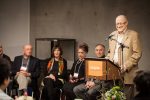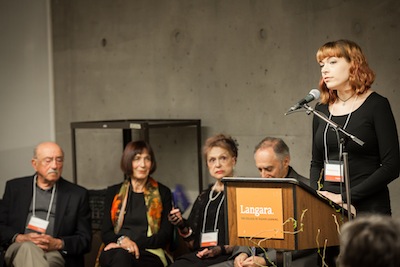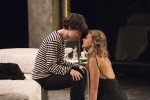This academic year marks the second session of Writing Lives, a two-semester project at Langara College, coordinated by instructor Dr. Rachel Mines. Writing Lives is a partnership between Langara, the Vancouver Holocaust Education Centre and the Azrieli Foundation. Last fall, students learned about the Holocaust by studying literary and historical texts. In January, students began interviewing local Holocaust survivors and are now in the process of writing the survivors’ memoirs, based on the interviews. Students are keeping journals of their personal reflections on their experiences as Writing Lives participants. They used their most recent journal entry to reflect on the topic of Multicultural Perspectives. Here are a few excerpts.
It’s been more than half a year since I decided to join the Writing Lives program. The historical context should have been enough motivation for me to join when I first heard of the program about a year ago, but I hesitated. I’d never done a writing project as large or as important as this. I felt that my skills and experience were inadequate in preserving the stories of Holocaust survivors. I still feel that way.
As a child and then later, as a student of history, I regarded my sources as just that: sources. The stories I listened to were filtered, edited for a younger audience. The books and films I read and watched were similarly altered. As I delved into the history and historiography of it all, I had an inkling in the back of my mind that people actually lived through these events, experienced them. But the moment our survivor partner started telling his story, it really struck me that yes, this is real, these are real people.
This project isn’t just a curiosity, an interest – it has become more of a duty. It has been mentioned many times since the program started that it is crucial for these stories to be told, written down and passed on, for time is running out. I never felt the gravity of that responsibility until we heard the history from someone who saw it with his own eyes.
– J.V. Malabrigo
***
Courses like Writing Lives are a reminder of the damage complacency can cause. Without knowledge, without tolerance, we are doomed to walk in circles until our hatred ends our capacity to recognize each other as human beings. We will fail to recognize that we all bleed, cry, laugh and need each other to survive.
I have learned the beauty of a human story. I have learned what it truly means to be triumphant and what it means to be a survivor. I am learning what it means to achieve true greatness and compassion, despite the lack of it that is shown to so many. I have explored the reality of how complacency may be our true enemy. I have learned that ignorance and acceptance of extremism means turning off our humanity and letting hatred rule minds and hearts alike.
We see history as ancient stories…. Through this class, I understand how to immortalize living, breathing history and to show a history of peace and love coming out of trauma and violence.
– Heather Parks
***
The Writing Lives program has had a significant impact on me. I hope to become an elementary school teacher, specifically teaching a primary grade (kindergarten to Grade 3). Holocaust education may be out of my hands in terms of the curriculum, but there is a major, never-ending lesson that I take away from this experience. I hope to teach my students the importance of embracing and celebrating our differences.
When someone looks different from us, celebrates different holidays, eats different food – whatever the case may be – these are opportunities to learn and to love. If there are things we notice about each other that we don’t understand, there are ways to respectfully ask questions. We will always have differences of views and opinions, but the most important thing to remember is that no single person’s opinion is “proper” or more important than anyone else’s. Our differences make us unique. Our differences are what make the world such an amazing place. If we remember the importance of respect and understanding, we can ensure that we will never see another Holocaust.
– Chelsea Riva
***
My father is Chinese South African. Born in 1965 in Johannesburg, South Africa, he grew up in the final stages of apartheid. This racist system denied people of colour, namely black people, basic human rights and dignity. Laws were based on the race or colour of a person and, while laws were well-defined for most ethnic groups, Chinese people in South Africa were such a small minority that most of their daily lives fell into a legal grey area. In this system, Chinese people were above black people, below white people. Chinese people in some cases would be allowed into white institutions but could be refused service at the discretion of the owner. While Chinese people were given certain privileges, at the end of the day, my family was denied the full rights of humanity. They had to carry identification cards, they were victims of racism and their lives were constructed in fear of punishment from a racist system whose punishment was seemingly random.
My mother is Japanese. Born in 1965 in Hiroshima, Japan, she grew up in a conservative society that often refuses to talk about its violent history of invasion, colonialism and war. This is not to say that my mother herself denies this history, but, in general, Japanese people become uncomfortable when discussing the role of Japan as an invading force in Asia. Numerous Japanese war crimes remain unacknowledged to this day, and even those that have been acknowledged have never reached the same global recognition as the crimes of the Holocaust.
It is unfair to compare separate instances of invasion, imprisonment or murder. The discrimination my father experienced was distinctive and had similarities to the Holocaust, but by no means was it the same. The invading history of my mother’s homeland was horrific, but to compare the actions of the Japanese army and government to those of the Nazis dilutes the complicated issues of Japanese society while disrespecting the unique experience of those terrorized by the Japanese. However, it was with knowledge of these two sides of my family, both Chinese and Japanese, that I took this class.
Taking this class did not change my perspective of the Holocaust. Instead, the Holocaust became more real, more detailed. I came to this class with the utmost respect for what we were studying and with an intense desire to do something that “mattered,” which is a common goal for many people my age. What I didn’t expect was to form such a personal connection with our survivor. I didn’t expect for it to become so real that I would break down crying.
My experience in this class has been enriching in ways that I didn’t expect. I don’t think that I can say this class changed me, but it deepened the ideas of legacy that I held because of my background, and it helped personalize the Holocaust. My family’s history helped me form a deep respect for my elders. Because of them, I learned that there is power in the retelling of stories told with fear, shame and beauty. I have family that comes from the side of both the oppressed and the oppressors, and this informed my perspective and my need to take this class.
– Yukiko Takahashi-Laisut



